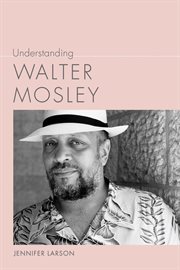Nonfiction
eBook
Details
PUBLISHED
Made available through hoopla
DESCRIPTION
1 online resource
ISBN/ISSN
LANGUAGE
NOTES
Walter Mosley is perhaps best known for his first published mystery, Devil in a Blue Dress, which became the basis for the 1995 movie of the same name featuring Denzel Washington. Mosley has since written more than forty books across an impressive expanse of genres including, but not limited to, nonfiction, science fiction, drama, and even young adult fiction, garnering him many honors including an O'Henry Award, an Anisfield-Wolf Book Award, a Grammy Award, a Pen Center Lifetime Achievement Award, and two NAACP Image Awards for Outstanding Literary Work in Fiction. In Understanding Walter Mosley, Jennifer Larson considers Mosley's corpus as a whole to help readers more fully understand the evolution of his literary agenda. All Mosley's texts feature his trademark accessibility as well as his penchant for creating narratives that both entertain and instruct. Larson examines how Mosley's writing interrogates, complicates, and contextualizes recurring moral, social, and even personal questions. She also considers the possible roots of Mosley's enduring popularity with a diverse group of readers. Larson then traces key themes and claims throughout the Easy Rawlins series to show how Mosley's beloved hero offers unique perspectives on race, class, and masculinity in the mid- to late twentieth century; explores the ways in which Fearless Jones, Mosley's second detective, both builds on and diverges from his predecessor's character; and looks at how the works featuring Leonid McGill, Mosley's junior detective, center on understanding the complex relationship between present-day social dilemmas and the personal as well as the communal past. Regarding Mosley's other genres, Larson argues that the science fiction works together portray a future in which race, class, and gender are completely reimagined, yet still subject to an oppressive power dynamic, while his erotica asks readers to reconsider the dynamics of power and control but in a more personal, even intimate, context. Similarly, in Mosley's nongenre fiction, stories are revived through a reconnection with the past, a reclaiming of cultural heritage and lineage, and a rejection of classist visions of power. Finally, Mosley's nonfiction, which persuades his audience to act through writing, humanitarian efforts, or social uprising, offers a mix of lessons aimed at guiding readers through the same questions that inform his fiction writing
Mode of access: World Wide Web







